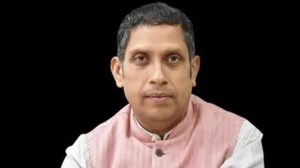This subcontinental shift
In identical statements issued by Prime Minister Vajpayee and US President George Bush last month, the two leaders announced the concretisat...

In identical statements issued by Prime Minister Vajpayee and US President George Bush last month, the two leaders announced the concretisation of a new strategic equation between India and the US. Bush issued his statement in Monterrey, New Mexico, where he was participating in a meeting of South American heads of state. Vajpayee8217;s statement came in New Delhi. They said that India and the US have agreed to expand cooperation in the areas of civilian nuclear activities, civilian space programmes and high technology trade. The two sides also agreed to commence negotiations on missile defence and related issues.
The statements were titled significantly as 8220;next steps in strategic partnership8221;. It is pertinent to re-produce the text of the rationale Bush gave for this important agreement. He said: 8220;We are partners in the war on terrorism and we are partners in controlling the proliferation of weapons of mass destruction and means to deliver them. The vision of the US-India strategic partnership Prime Minister Vajpayee and I share is now becoming a reality. The expanded cooperation is an important milestone in transforming the relationship between the US and India, based increasingly on common values and common interest. The agreement will deepen the ties of commerce and friendship between our two nations, and will increase stability in Asia and beyond.8221;
This policy pronouncement is the result of painstaking negotiations at official levels between the two countries spread over the last 18 months or so. Brajesh Mishra8217;s interaction with his US counterparts laid the foundation for these agreements. Former Foreign Secretary Kanwal Sibal held discussions with US Under Secretary of State Mark Grosman and US Under Secretary for Commerce Kenneth Juster. Details of these agreements were negotiated in several meetings of the Indo-US high technology cooperation group. Final touches to agreements covering civilian nuclear cooperation and civilian space cooperation were given by a delegation led by Deputy National Security Advisor Satish Chandra which visited Washington this winter.
Indo-US relations have had their hiccups since 1998, when India conducted its nuclear tests and also expanded its missile capacities. India8217;s disappointment over US involvement with the Musharraf government and wariness about Washington8217;s invitation to send Indian troops to Iraq did affect the evolving positive chemistry in bilateral relations. Differences of opinion on these points, however, did not affect the broad constructive orientations of Indo-US engagement, as is evident from this latest high-level policy statement on strategic cooperation issued simultaneously by Bush and Vajpayee. Factors which contributed to the process include the personal equation between the two heads of government. In addition, India adopted a generally supportive posture in favour of the US on a number of important policy decisions taken by Bush regarding national missile defence and theatre missile defence, the stabilisation of Afghanistan and US policies related to Asia. In turn, with Bush acknowledging the ground reality of India becoming a nuclear weapons power and its policy decision not to conduct further nuclear tests and abide by the non-proliferation export control regimes, differences of opinion on India8217;s nuclear weaponisation were neutralised to a great extent.
India8217;s pursuit of economic reform and liberalisation also evoked a positive response from the US. There is a deep convergence of interests between India and the US on countering international terrorism and religious extremism. Overarching these factors is the perception in the US establishment that in the post-Cold War era India, as a stable democracy based on institutional solidity, can be a more reliable partner in America8217;s policy objectives in the Asian region. This perception has translated into expanded economic relations as well as greater defence cooperation.
India8217;s initiative in restoring the dialogue with Pakistan has strengthened this perception about India as a rational and stabilising factor in the West Asia and South Asia regions which are in ferment due to recent developments in Iraq, Afghanistan and Pakistan. These positive trends have been backed up by continuous exchanges between the strategic communities and think-tanks in both countries.
The agreement between Vajpayee and Bush will result in American assistance in safety mechanisms for India8217;s nuclear facilities. It will lead to cooperation between the two nuclear regulatory agencies and joint production of civilian satellites. It will ease the unilateral licensing requirements for the transfer of high technology and dual use technology items for India. The negotiations also indicate an inclination on the part of the US to provide some kind of umbrella to India in tandem with the Indian Missile Defence Programme.
In this context, it is necessary to assess the implications of developing Indo-US equations. India would have to be sensitive and alert about reactions from Russia, China and Pakistan. Agreements with the US should not negatively affect India8217;s relations with China and Russia. One has to examine whether nuclear, space and missile cooperation will result in the US desiring some quid pro quo in capping or restricting India8217;s options to sustain its nuclear and missile defence capacities. Will these agreements increase America8217;s pressures on India to compromise with Pakistan on Kashmir beyond the thresholds India can reasonably countenance. India will have to tailor its export control regimes to conform to US standards which is not difficult. The question is, how fast can India do this without eroding its political autonomy in dealing with the issue?
America8217;s stance on not exporting civilian nuclear plants to India or cooperating with India on joint space launches is not going to change. Will there be indirect pressure on India to fashion its policies towards Iran in conformity with US apprehensions and attitudes towards that country?
India will thus have to carefully calibrate its policies on these issues.
- 01
- 02
- 03
- 04
- 05






























